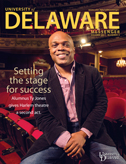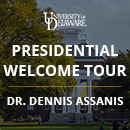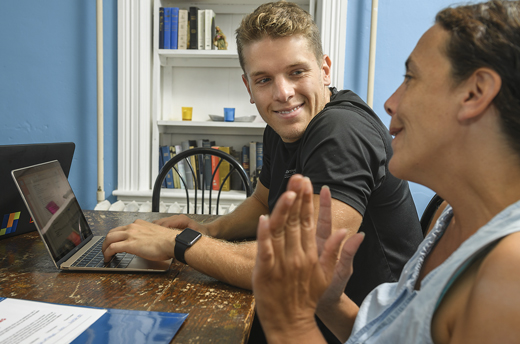
Rising to the challenge
Student organization helps homeless men and women find jobs
OUR STUDENTS | What professional skill do college students practice far more frequently than most? It’s no trick question. At the end of his first semester, Matt Rojas, BE17, realized he and his classmates were “uniquely fluent” in job searches and resumes.
So Rojas, who had been looking for community service opportunities, gathered a group of friends and cold-called the Emmaus House, a homeless shelter in Newark, Delaware. They offered to put on a job search workshop for free. Two weeks after the workshop, the Emmaus House called back. One of the attendees had gotten a job…could the students return for another session?
Another workshop, another hiring. “That’s when we realized we might be onto something,” says Rojas. He and his colleagues soon started calling shelters across New Castle County. In the fall of 2014, they became a campus Registered Student Organization. By December, they were starting the legal process to become a 501(c)(3) tax-exempt nonprofit. They decided on the name Lazarus Rising, after the Biblical figure whom Jesus raised from the dead. “Almost all shelters are faith-based, so the name shows that we’re familiar with their values,” says Rojas. “And it just sounds cool.”
Giving back
A recent survey conducted by the National Alliance to End Homelessness found that, on any given day, more than 600,000 people are homeless. As Alliance President Nan Roman says, “Unemployment remains one of the leading causes of homelessness.” A host of small factors conspires to prevent homeless people from getting hired. They have no place to safely store documents like resumes and birth certificates. Often, they have no access to a computer or ability to do job searches. Some may not own clean, business-appropriate attire. Most insidious of all, many feel too ashamed to even apply.
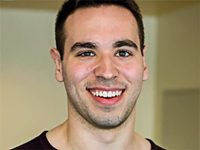


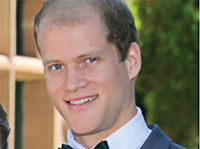
Rojas grew up in Long Island, always wondering what more he could do for the homeless men, women and children he’d often see in New York City. He attributes this, along with his family’s story, to his desire to give back.
His father immigrated to the United States from Ecuador, working multiple jobs to put himself through community college, then through a four-year program. Now he’s a civil engineer.
“I want to help other families do what my family was able to,” says Rojas, an Honors double major in economics and public policy and recipient of a Unidel Eugene du Pont Memorial Distinguished Scholarship. “I want them to be able to tell the stories my family tells.”
To date, Lazarus Rising has conducted workshops with more than 60 people. Of their graduates, 47 percent have been hired within one month.
“Not just what they do, but the way they do it”
Lazarus Rising workshops consist of two one-hour, one-on-one sessions. This first hour is all about resumes. The second starts with a practice interview and ends with an online job search. Volunteers make sure participants have an email address and encourage them to submit their first applications on the spot.
The sessions are intimate because Lazarus Rising wants to create a bond between volunteers and participants. But things don’t always start smoothly. According to Rojas, when volunteers enter a shelter, they often hear, “No thanks, I’m good.” Some participants don’t want to disclose their troubles. Many act tough and unconcerned.
It can be a difficult hurdle. But the Lazarus members are persistent—and bring a genuine warmth and commitment.
“I’ve been incredibly impressed,” says Pat Marks, executive director of Meeting Ground, an Elkton, Maryland, organization that provides services to homeless people. “They’re so personable. It’s not just what they do, but the way that they do it.”
Lazarus holds weekly workshops at Meeting Ground’s day shelter. Program Director Shenise Daughtry remembers one in which an elderly woman who had been employed all her life despaired writing a resume—she had never needed one before. “She came back smiling from ear to ear,” Daughtry says. “She told me, ‘They made me feel like a rock star!’”
Such stories are quite common. Marks recalls a man who had been incarcerated for 25 years. An interviewer looking at his resume would inevitably ask about the gaps in his employment record. The Lazarus volunteer, however, rewrote it from chronological order to functional format as a way to emphasize the skills he acquired in work release.
Rojas loves all that the resume symbolizes: “Here are the things you’ve accomplished.” And Marks sees the value of this mindset: “If you believe I’m worth it, I’ll start to believe it too.”
Help from Horn
A major force behind Lazarus’ own rise has been UD’s Horn Program in Entrepreneurship. Lazarus won $2,500, about half its annual budget, with a second-place finish in the 2016 First Step competition, sponsored jointly by the Horn Program and the College of Health Sciences to address grand challenges. Lazarus saw a personal victory in a separate Horn Program competition as Chief Innovation Officer Eric Albers, BE17, received the 2016 Shawn and Sheryl McCall Award for Entrepreneurship, a $2,500 award given to students who show entrepreneurial promise.
Lazarus members credit part of the organization’s success to the sophistication of the Horn Program’s VentureOn initiative, which provides select student organizations with resources, mentorship and 24/7 access to the cutting-edge Venture Development Center (VDC).
At first, they were holding business meetings in a coffee shop. The sleek conference rooms at the VDC changed that. “It’s amazing how having a space and a time makes you act more like a professional,” says Rojas. “That access to resources is unparalleled, especially for a nonprofit that’s just starting up.”
Looking ahead
After graduation, Rojas will enter the Marine Corps as a second lieutenant. He’s confident the organization he founded will continue to flourish. Already, the UD chapter has a core of 50–60 students, with current leaders grooming younger students to take over.
He also envisions a nationwide presence for Lazarus, which has created and trained chapters at eight other colleges to date and is currently in the process of registering the UD-developed nonprofit in other states.
In the meantime, perhaps this is the most promising sign of all: The students who started an organization through cold calls to homeless shelters now have homeless shelters calling them.
Article by Zachary Davis, AS17
